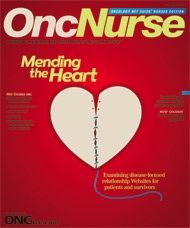Oncology Nurse Navigators Address Psychosocial Support
Oncology nurse navigators (ONNs) provide individualized assistance to patients, families, and caregivers to help overcome healthcare system barriers and to facilitate timely access to quality medical and psychosocial care from pre-diagnosis through all phases of the cancer experience.
Oncology nurse navigators (ONNs) provide individualized assistance to patients, families, and caregivers to help overcome healthcare system barriers and to facilitate timely access to quality medical and psychosocial care from pre-diagnosis through all phases of the cancer experience. Challenges faced by patients with cancer may change throughout their treatment and may never be eliminated. In addition, patients will experience varying levels of anxiety or distress following their diagnosis, but only small percentages receive help. ONNs have an opportunity to decrease the anxiety experienced by newly diagnosed patients and those facing recurrent disease from the moment they engage with the patient.
At any time, a patient may experience strong emotions such as fear, anger, sadness, depression, anxiety, depression, panic, isolation, or a combination of these. Addressing patient distress is important because ignoring it can lead to an unpleasant emotional, psychological, social, or spiritual experience that interferes with the patient’s capability to cope with cancer treatment. If psychosocial support is lacking, the patient’s ability to relate to family, friends, coworkers, and others throughout the normal routines of daily living also may be affected. Social distress can be as overwhelming as when the patient first heard the words “You have cancer.”
Building bonds of social support for patients should be one of the ONN’s priorities. Patients with cancer are often removed from the flow of life, spending time getting treatment rather than at work or with family. Cancer can be an incredibly isolating experience. ONNs, along with other members of the patient’s multidisciplinary cancer treatment team, can assist the patient in finding new ways to connect with others. Encouraging patients and their caregivers to reach out to their family, friends, or join a support group that will help establish these relationships is important; however, because friends or family may not always know when or how to offer help, patients should also understand the benefits of discussing their concerns and worries with a mental health professional. Because of the level of interaction between ONNs and patients, ONNs may be the first to recognize which patients would benefit from meeting with a licensed clinical social worker or psychologist. Further, because patients develop bonds with their ONN, they may be more prone to opening up and discussing their concerns, which can help ONNs navigate patients through their care.
Although ONNs have many responsibilities, addressing patients’ psychosocial well-being should never be overlooked. Conducting a comprehensive, ongoing assessment, including an evaluation of the patient’s mental well-being, is the responsibility of every ONN and should be completed at every client encounter. ONNs can assist their patients and assess their psychosocial status by:
•Listening closely to their patients’ concerns
•Showing interest in their patients’ cancer experience
•Asking their patients who will provide support during their cancer treatment (family, friends, or others)
•Asking their patients how they are adjusting to their cancer and treatment plan
•Encouraging patients to continue using coping strategies that are successful
•Suggesting additional coping strategies to address their patients’ individual concerns
In addition, ONNs can use a distress thermometer, which is based on a scale of 0 to 10 and easy to use. The tool, which was originally designed to be used by physicians to assess patient distress levels, is available at www.nccn.org. It comes with a checklist to help evaluate and recognize distress in patients with cancer.
Because a diagnosis of cancer never interrupts a patient’s life when it is convenient or economically acceptable, the psychosocial well-being of your patient may never be addressed or addressed late in the patient’s treatment. ONNs can provide a comprehensive understanding of the patient’s psychosocial status to other members of the multidisciplinary team and take the lead role in assessing the patient’s needs for possible referral to a mental health specialist.
Sharon Francz, LPN, BSHA, is the oncology nurse navigator at Shady Grove Adventist Hospital, Rockville, MD, and president, National Coalition of Oncology Nurse Navigators (NCONN).
2 Commerce Drive
Cranbury, NJ 08512
All rights reserved.
